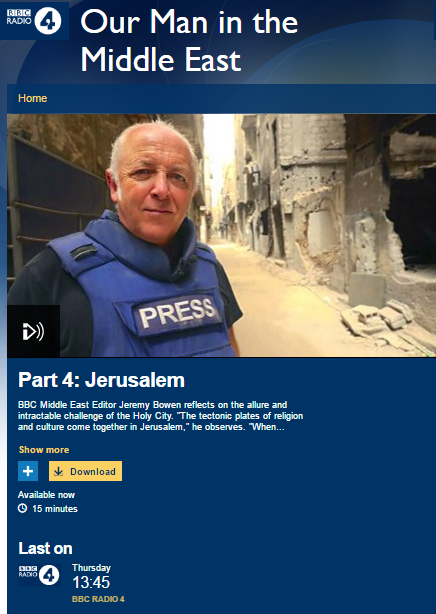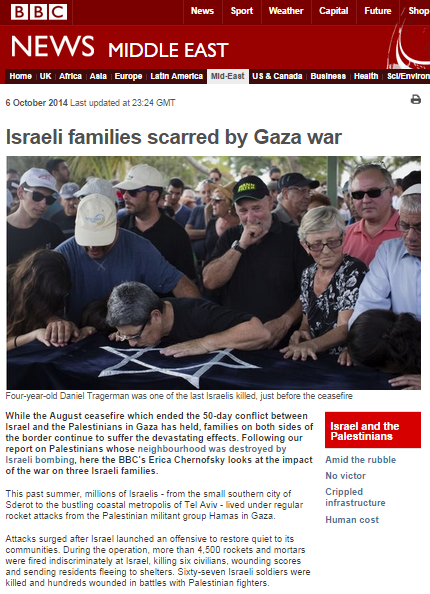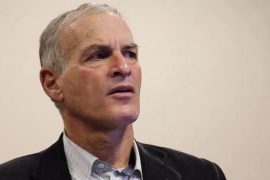On May 18th listeners to BBC Radio 4 heard the fourth part in Jeremy Bowen’s series of programmes ‘Our Man in the Middle East’.
Titled ‘Jerusalem’, the programme is both rambling and predictable, with Bowen’s portrayal of the city focusing on blood, violence, religion, power and nationalism at the expense of any mention of its diversity and eclectic coexistence.
From his opening sentences onward, Bowen places the spotlight firmly and exclusively on ‘the conflict’:
“The first thing to understand about the struggle for Jerusalem is that they’re fighting over a tiny piece of land. Down there in that walled compound around the golden dome is the single most contested piece of land in the Middle East; probably the most contested piece of ground in the world.”
Following reminiscences of a poorly explained incident during the first Intifada, Bowen tells audiences that:
“The incident in Azariya was a soft introduction to the hard reality of the city of peace – which is the Hebrew translation of Jerusalem. In real life I can’t think of a city with a more blood-stained history. Tension, hatred and violence simmer alongside piety. Sometimes they’re part of it.”
Seeing as the name Jerusalem in English and other European languages derives from Latin and Greek translations of Hebrew texts, it would clearly have been more accurate for Bowen to refer to the Hebrew meaning of Jerusalem rather than “translation”.
Recalling his first trip to Jerusalem, Bowen downplays Palestinian terrorism – including international aircraft hijackings – by making a generalised and falsely equivalent reference to “violence in the Middle East”.
“When I changed planes in Zurich I saw flights to Israel had their own separate terminal [sic]. A small armoured car lumbered behind the bus to the aircraft. Violence in the Middle East had leaked into the rest of the world.”
Following archive recordings of news reports of events including the Munich Olympics massacre and the Entebbe operation, Bowen indulges himself with the claim that mere reporting from the region – rather than inaccurate or biased reporting – sparks objection.
“The tectonic plates of religion and culture come together in Jerusalem. When they move, we all feel it. Reporting the conflict between Arabs and Jews is a great way to make enemies. Many people feel connected to it even if they’ve never been to the Middle East.”
The man who once invented a new quarter in the Old City of Jerusalem goes on to provide a context-free account of “access restrictions” which again erases Palestinian terrorism and violence from the picture.
“Jerusalem is one of the most complicated issues and you can get a good idea just by walking around the walled Old City, which is what I’m going to do. I’m going in through Damascus Gate which is the main entrance for Palestinians more or less. It’s early evening so the shops are starting to close up. There’s a boy there who’s shouting out; selling bread to the Palestinians going home. There used to be more people selling things outside Damascus Gate: women who’d wear embroidered village dresses selling herbs. Now you see fewer of them these days and the reason for that is that they simply can’t get into Jerusalem and that’s because of the access restrictions that Israel has put in.”
In a section about “European imperial powers”, Bowen once again promotes his misrepresentation of the Hussein-McMahon correspondence to BBC audiences.
“In fact the British were without any humility at all, carving up the Middle East, making contradictory promises to Arabs and Jews and setting them up for conflict.”
Bowen goes on to give an inaccurate description of the Western Wall.
“So it’s dark now and the moon’s out and I’m at the place really that is the hub of it all. This is the Western Wall Plaza; the big open space going down to the…what was known for many hundreds of years as the Wailing Wall; the holiest place in the world for Jews to pray.”
The Western Wall is of course the holiest site at which Jews can currently pray but Bowen refrains from informing his listeners that Jews are not allowed to pray at the holier site of Temple Mount due to objection by the Waqf.
Delaying the start of the Muslim siege of Jerusalem by two years, Bowen tells listeners that:
“Then in 638 Arab followers of the new religion of Islam besieged the city. It was by Jerusalem’s blood-soaked standards a peaceful conquest.”
Later he recycles a visit he made to an archaeological site in 2014, telling listeners that:
“East Jerusalem was captured by Israel from Jordan in the 1967 war and it’s claimed by the Palestinians as capital of their future state.”
No further context is provided and as was the case in his original report, audiences are not told of Jordan’s belligerent occupation of part of the city in the 19 years prior to the Six Day War or that those nineteen years were the only time that the city was divided.
Quoting writers Amos Elon (whom he calls Amos Alon), Amos Oz and Mahmoud Darwish, Bowen closes the item while reinforcing his main message:
“It’s impossible in Jerusalem to disentangle religion from power.”
In summary, Radio 4 listeners heard nothing new: the same jaded themes that Bowen has promoted over the last 25 years have simply been recycled and condensed into this latest item. Deliberately short on context, downplaying Palestinian terrorism and misrepresenting history, Bowen’s report tells BBC audiences nothing of real life in a city which is much more than just part of the much wider conflict.
Related Articles:
BBC’s Bowen invents new quarter in Jerusalem
BBC Radio 4 launches a new ME series by Jeremy Bowen
BBC’s ME Editor misrepresents the Hussein-McMahon correspondence




